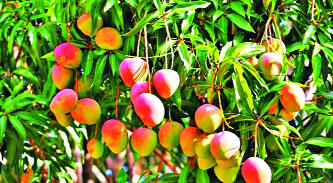A local company has taken a move to bring 700 farmers in the south-western region under contract farming to grow pest-free mango and vegetables aiming to boost its export, officials said.
Under the concept of contract farming, M/S Islam Enterprise, a leading exporter of agro produce, will support the farmers in Satkhira and Jessore districts as part of its move.
When local fruits and vegetables shipment has been facing hurdles in regions like European Union (EU) due to strict quarantine regulations, such a move of the company could benefit exporters, said insiders.
Islam Enterprise exports 10-12 tonnes of vegetables and fruits a week to the UK, France and Italy.
Md Zahirul Islam, proprietor of the company, told the FE that they have targeted 200 mango and 500 vegetable farmers in Satkhira and Jessore districts to encourage them in modern contract farming with technical support from Solidaridad Network Asia.
Solidaridad, a Netherlands-based international organisation, facilitates the development of socially responsible, ecologically sound and profitable supply chains globally.
Mr Zahirul said his company has recently signed a memorandum of understanding (MoU) with the civil society organisation in this regard.
He said his company and few other companies including Morrison Ltd will work together.
“We have targeted to produce 200 tonnes of pest-free mangoes and 1,000 tonnes of pest-free vegetables in a year through contract farming,” he said.
Both the farmers and exporters will benefit from the contract, he said.
“We will work with farmers at Tala, Kalaroa, Debhata and Satkhira sadar upazilas to grow Himsagor, Lengra and Amrapali varieties of mango,” he said.
Jessore farmers will grow vegetables including pointed gourd, bottle gourd, bitter gourd, local bean, brinjal and green chilli, he said.
When asked, he said teasel gourd, lemon, pointed gourd, and bitter gourd face more phytosanitary tests than that of other vegetables.
Supermarket and Distribution Specialist of Solidaridad Mohammad Moziball Hoque told the FE that some quarantine rules set by the EU have emerged as obstacles for Bangladeshi products.
He said EU ‘phytosanitary’ requirements especially focus on contract farming.
He said his organisation has been working to develop livelihood of 57,000 farmer households under the Sustainable Agriculture, Food Security and Linkages (SaFaL) programme.
Hoque pointed out that this year some companies have sent 25 tonnes of mango to France, the UK, Italy and Germany collected from orchards in Satkhira which are under the supervision of Solidaridad.
Not a single consignment of 25 tonnes faced any ‘interception’ when many other consignments were rejected, he said.
“We train farmers in good agriculture practice (GAP) with help of the state-run Department of Agriculture Extension (DAE),” he said.
Dr Mohammad Ali, Director, Strengthening Phytosanitary Capacity in Bangladesh Project under DAE, told the FE that 300 tonnes of mango were exported this year from Bangladesh while more than 750 tonnes last year.
He said apart from quarantine rules, many of the consignments were intercepted due to compulsory requirements of contract farming which local companies lack.
He said success in producing pest-free mango and vegetables in Satkhira and Jessore may encourage many other companies.
Agro produce exports remained almost static in the last fiscal year (FY’16) at US$ 596 million compared to that of FY’15, according to the Export Promotion Bureau (EPB).
Vegetables exports increased by 1.7 per cent to $ 104.34 million, but fruit exports declined by 48 per cent to $ 20.23 million in FY’16 than that of its previous fiscal.
Source: TheFinancialExpress











